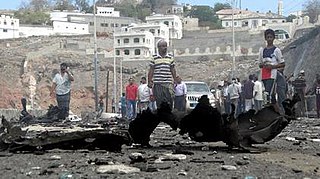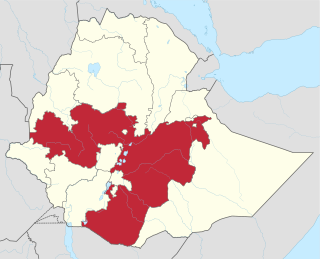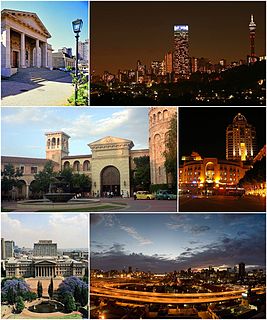
The Oromo Liberation Front is an organisation established in 1973 by Oromo nationalists to promote self-determination for the Oromo people against perceived Abyssinian colonial rule. The proponents of the movement hold that Amhara hegemony has been oppressing and suppressing the Oromo people and their culture. The movement is the culmination of over 70 years of uncoordinated resistance by Oromos against this condition. It has been outlawed and labelled a terrorist organisation by the Ethiopian government. The OLF has offices in Asmara, Washington, D.C. and Berlin from where it operates Amharic and Oromo-language radio stations.

The South Yemen insurgency is a term used by the Yemeni government to describe the protests and attacks on government forces in southern Yemen, ongoing since 27 April 2009, on South Yemen's independence day. Although the violence has been blamed on elements within the southern secessionist movement, leaders of the group maintain that their aims of independence are to be achieved through peaceful means, and claim that attacks are from ordinary citizens in response to the government's provocative actions. The insurgency comes amid the Shia insurgency in the country's north as led by the Houthi communities. Southern leaders led a brief, unsuccessful secession in 1994 following unification. Many of them are involved in the present secession movement. Southern separatist insurgents are active mainly in the area of former South Yemen, but also in Ad Dali' Governorate, which was not a part of the independent southern state. They are supported by the United Arab Emirates, even though the UAE is a member of the Saudi Arabian-led coalition working to support the Yemeni government under President Abdrabbuh Mansur Hadi.

The Yemeni Uprising (intifada), and also known as the Yemeni Revolution of Dignity followed the initial stages of the Tunisian Revolution and occurred simultaneously with the Egyptian Revolution of 2011 and other Arab Spring protests in the Middle East and North Africa. In its early phase, protests in Yemen were initially against unemployment, economic conditions and corruption, as well as against the government's proposals to modify Yemen's constitution. The protesters' demands then escalated to calls for the resignation of Yemeni President Ali Abdullah Saleh. Mass defections from the military, as well as from Saleh's government, effectively rendered much of the country outside of the government's control, and protesters vowed to defy its authority.
The outbreak of the Libyan Civil War was followed by accusations of human rights violations by rebel forces opposed to Muammar Gaddafi, Gaddafi's armed forces, and NATO. The alleged violations include rape, extrajudicial killings, ethnic cleansing, misconduct and bombings of civilians.
On 7 May 2011, during the Civil uprising phase of the Syrian civil war, the Syrian military launched an operation in the Syrian city of Baniyas. The government said it was targeting terrorist groups, while the Syrian opposition called it a crackdown against pro-democracy protesters. The operation lasted until 14 May 2011.
Events in the year 2014 in Pakistan.
This is a list of 2015 events that occurred in Europe.
The following lists events from 2014 in Nigeria.
The following lists events that happened during 2014 in Iraq.
The following lists events the happened in 2013 in Iraq.
The following lists events that happened in 2013 in Nigeria.
The following lists events that happened during 2014 in Yemen.
The following lists events that happened during 2015 in the State of Libya.

The Islamic State of Iraq and the Levant is a militant Islamist group active in Libya under three branches: Fezzan Province in the desert south, Cyrenaica Province in the east, and Tripolitania Province in the west. The branches were formed on 13 November 2014, following pledges of allegiance to ISIL leader Abu Bakr al-Baghdadi by militants in Libya.

The Yemeni Civil War is an ongoing conflict that began in 2015 between two factions: the internationally recognized Yemeni government, led by Abdrabbuh Mansur Hadi, and the Houthi armed movement, along with their supporters and allies. Both claim to constitute the official government of Yemen. Houthi forces controlling the capital Sana'a, and allied with forces loyal to the former president Ali Abdullah Saleh, have clashed with forces loyal to the government of Abdrabbuh Mansur Hadi, based in Aden. Al-Qaeda in the Arabian Peninsula (AQAP) and the Islamic State of Iraq and the Levant have also carried out attacks, with AQAP controlling swathes of territory in the hinterlands, and along stretches of the coast.

A military intervention was launched by Saudi Arabia in 2015, leading a coalition of nine countries from the Middle East and Africa, in response to calls from the internationally recognized pro-Saudi president of Yemen Abdrabbuh Mansur Hadi for military support after he was ousted by the Houthi movement due to economic and political grievances, and fled to Saudi Arabia. Code-named Operation Decisive Storm, the intervention is said to be in compliance with Article 2(4) of the UN Charter by the international community; this has been contested by some academics. The intervention initially consisted of a bombing campaign on Houthi rebels and later saw a naval blockade and the deployment of ground forces into Yemen. The Saudi-led coalition has attacked the positions of the Houthi militia, and loyalists of the former President of Yemen, Ali Abdullah Saleh, allegedly supported by Iran. The Houthis who had pressured Mansur Hadi for reforms, say that they took power through a popular revolt and are defending Yemen from a western backed invasion. The Saudi-led bombings soon expanded to most of Western Yemen including civilian targets and was followed by UAE-led deployment of ground forces in the South.

The Aden unrest refers to initialy ongoing conflict between Islamist factions, such as al-Qaeda in the Arabian Peninsula, and Islamic State of Iraq and the Levant's Yemen Branch, against the loyalists of president Abd Rabbuh Mansur Hadi and later to conflict between UAE-backed and Saudi-backed factions within the coalition. In 2017, fighting also broke out between factions aligned with different members of the Saudi-led coalition namely Saudi Arabia-backed Abdrabbuh Mansur Hadi and Al-Islah and UAE-backed separatist Southern Transitional Council and Southern Movement.
Protests erupted in Ethiopia on 5 August 2016 following calls by opposition groups. Protesters demanded social and political reforms including an end to human rights abuses. The government responded by restricting access to the Internet and attacking as well as arresting protesters.
















